#the medium is the message
Text
i remember when social media 1.0 (facebook, twitter, youtube) was touted as revolutionary for the media environment, that it would help hold legacy media accountable, promote genuine narratives of what's happening on the ground, and end propaganda. back in 2010-2012, it seemed like occupy wall street and the arab spring were offshoots of that new, democratic, decentralized means of political organization, a kind of "people's media". both movements failed, and within three years social media helped spawn Brexit, Qanon, and endless other conspiracy theories
268 notes
·
View notes
Quote
Electric circuitry has overthrown the regime of "time" and "space" and pours upon us instantly and continuously the concerns of all other men. It has reconstituted dialogue on a global scale. Its message is Total Change, ending psychic, social, economic, and political parochialism. The old civic, state, and national groupings have become unworkable. Nothing can be further from the spirit of the new technology than "a place for everything and everything in its place." You can't go home again.
Marshall McLuhan, Quentin Fiore, Jerome Agel, The Medium is the Massage: An Inventory of Effects
#quote#Marshall McLuhan#McLuhan#world#global#media#media theory#communications#technology#digital#computers#Quentin Fiore#Jerome Agel#The Medium is the Massage#The Medium is the Message#culture#time#space#social#social media
136 notes
·
View notes
Text
Don't Let the Packaging Get to You😭...
this is my follow-up on "2023 Is the Year to Become A Mindful Consumer"
We learn to buy things based on their packaging - the labels, the colors, graphics, etc. It gets both the logically minded and artistically minded alike. Looking beyond the packaging is not a matter of "not judging a book by its cover." It's important to outsmart the package's many ways of crying out "buy me!" Next thing you know, you've come home with a facial serum that breaks you out, a superfood powder that's 85% powdered rice grains, a drink you saw hyped up on TikTok, and a laundry detergent that claimed was "environmentally friendly" but the contents are just like the conventional brands. You might not even realize how many disappointing purchases you make like this. But if they fooled you, they've surely fooled others -- which fuels the company's marketing team to become more convincing & appealing.
First thing to address is your mentality when you enter a store or online shop. Realize that the point of the set-up is to get you to leave with as many products as possible, spending the most money possible, and leave with the thought of as many products as possible in your mind. If you struggle with sticking to just what you need, understand what is it about the store (its layout, employees, samples, etc) which cause you to be so easily convinced.
Next, understand what kind of customer you are. Place yourself in the shoes of a product marketer. What would you put on a package to sell it to yourself? How would you design that package? Who would you sponsor to convince you even further to buy that package? Look at the common denominators between the products you buy. Do you like going for the tried-and-true/popular brand, glam or sleek aesthetics, environmentally-friendly or ethical claims, more affordable option, latest trends, "doctor recommended" claims, or whatever else?
Also, understand what it means to make a purchase. Sure, everyone has heard that we vote with our dollars. But we don't always take full responsibility or power of our positions. Let's say that you like a product's contents except it's watered down with some waste product (like mineral oil), or you know that the company is deluding consumers with its claims & people are getting sick from it, or you learn that a shop aligns its aesthetics to look a lot like a small & mindful boutique but really it's just a normal sweatshop-run production. What can you do? The easiest thing you can do is not buy from that company (buy from a small business with great practices or make it yourself). You can leave reviews which share the truth. You can contact companies to see if they will consider different ingredients, materials, etc. You should talk about the company with others. You can even discreetly move products in a store so that their less noticeable to shoppers (as to decrease their sales. This isn't something petty, but to prevent funding dangerous or unethical items).
Finally, it's always good to have the habit of questioning, "Do I really need to buy this?" This is how mindless consumption really becomes mindful. It's better to find ways to make the product on your own. Normally, we look at the selection of products offered to us and consider, "What among this appeals to me?" Really, most of what we buy has either convinced us that we need it or it is the closest fit to a product which will serve our life. Creating an item which suits you exactly is better by far because it tends to eliminate more of the unnecessary evils and "unknowns" which come with our industrialized products.
Soon, you'll get in the habit of getting only what you need, being more resourceful & creative, seeing through the marketing tactics, learning about what goes into production processes, and finding fun in supporting true artistry & ingenious handmade creations. You'll begin to feel freer and less easily swayed. This is an important piece in taking control over what kind of lifestyle you live and the impact it has.
#txt#mindful consumption#unlearning#solarpunk#eco#mindful living#slow living#marketing#late stage capitalism#mindful consumerism#spiritual growth#leveling up#holistic leveling up#ethical consumption#intentional living#the medium is the message#conscious consumption#persuasion#awareness#advertising#mindfulness#third eye#sidewalkchemistry
34 notes
·
View notes
Note
Do you think the Taylor NYT piece outed her?
This question can only really be answered alongside a consideration of what it means for a major media entity to out a celebrity.
First there's what outting means for the individual. I do think it's important to distinguish between this article and what The Sun does. Taylor is very definitely not out now.
However, on the individual level there are two aspects of that piece that I think are completely unacceptable, a huge violation of boundaries, and the NYT should never have published them:
A detailed list of why the author thought that a living person who was not out was queer (including a detailed theorising that they might have been planning on coming out and then decided not to).
An extended discussion where the author talked with authority and certainty about the sexuality and experience of the sexuality of a living person who was not out (the last section).
To have those conversations in a cultural forum that has has a huge general audience and authority is a violation - and a conversation in that forum has nothing in common with the way those same discussions have been taking place in queer spaces for as long as they've existed.
I think one of the biggest indicators of the indefensibleness of publishing in the New York Times - was the explaining of 'hairpin drop'. The whole point of a hairpin drop (to quote the article itself) is that only some people will understand it. The audience for a hairpin drop is only the people who already understand it. If you're using broadcast media to explain hairpin drops to a wide audience - then that is a cultural violation as well as an individual violation. It actively kills queer culture whose purpose is to allow queer people to communicate with each other without wider straight culture noticing to write an explainer for straight people about it in NYT.
(I also don't think she did a very good job - I think Taylor has had sex with women - and I was like - none of this is convincing)
********
But I think it's a mistake to think about the media outting as just being about individuals. Media outting also has a policing role - the effect of outting in major media (and often explicitly the purpose) - is to single that someone has crossed a line - and to warn other people that there will be consequences if they cross the same line.
So my biggest concern about this article isn't about Taylor (it's never about Taylor). What this article said reasonably explicitly - is that if you engage in any form of queer culture - including culture that has been developed to explicitly talk to queer people in plain sight without being intelligible to a wider culture - then cultural norms about your right to disclose your own sexuality and right not to be outted do not apply to you. But it's not just the fact that the article was making that argument that is the problem. By publishing the article the NYT wasn't just endorsing that argument - it was enacting it.
I think the line that is being policed here is not about queerness directly - but about queer culture. The argument is that closeted people can't and shouldn't engage with any queer culture. That's the message that young queer artists who don't know how they want to discuss their sexuality publicly yet will have gotten loud and clear. It's the message that closeted kids will take - that queer culture is for when you are ready to be public about your sexuality - that it is not yours until you have taken that step - and can't be part of figuring out
That policing is the through line between this NYT pieces and other media outtings. And that is ultimately why I thought that article was destructive and wrong.
#That's why I found the CNN statement completely reasonable#and the fans who saw the CNN statement as a personal attack pretty incomprehensible#the medium is the message#that article would be something I thought was fucked up and wrong if it was published on tumblr#but it takes on a completely different meaning when published in the NYT#and that meaning actively damages queer people and culture#and opposing that message is important
12 notes
·
View notes
Text
“It’s the format. No, not really. It’s what you do with the format.”
Murderbot could write Marshall McLuhan but Marshall McLuhan could not write Murderbot
#murderbot diaries#murderbot#The medium is the message#HSHSHSHSHSHSHSHS#oh my god i love being a comms student#moonymovetheglass.txt
10 notes
·
View notes
Text
Due to the nature of scrolling through tiktok every video has to grab your attention within the first few seconds of watching. As a consequence popular tiktok videos tend to give the same impression as skippable youtube ads
#I'm not hating on tiktok here#Lots of platforms encourage shit like this#Tumblr has reblog bait#Youtube has clickbait#Reddit has low quality short form content that doesn't require as much attention as effortposts (mostly reposted memes)#Tiktok#the medium is the message#Social media
4 notes
·
View notes
Text
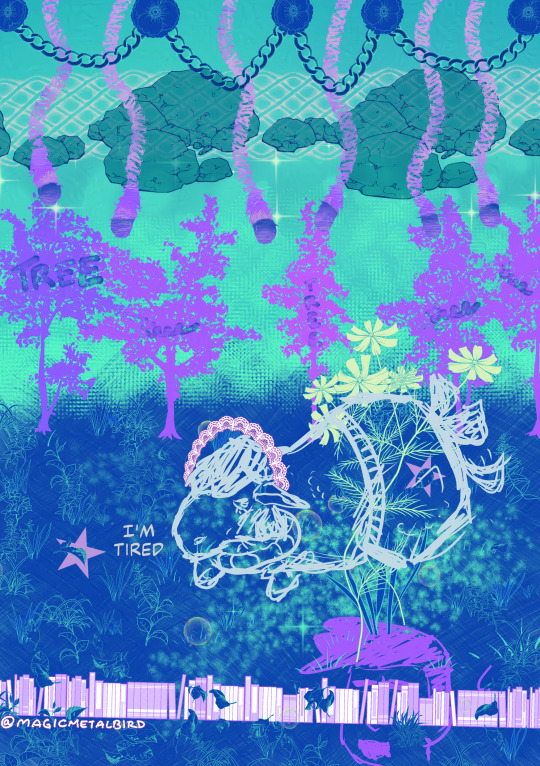
"Response to AI Art" 2024
#noai#artists on tumblr#conceptual#the medium is the message#mark making#digital art#retaliation#turquoise#violet#blue#haltone#kidpix vibes#kidpix#clip studio paint#liminal#human#cosmos#flowers#cartoon#sheep#I'm tired#art#glazed
2 notes
·
View notes
Text
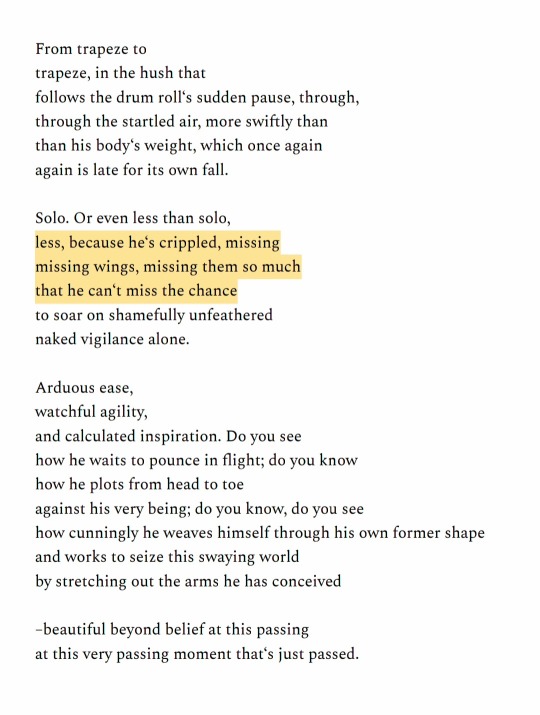
The Acrobat (1996) by Wisława Szymborska
In Episode 130, Rachel shares a poem that cannot be described better or more accurately than Griffin.
Griffin: That is a poem ass poem right there.
Rachel: [laughs] I love, though—you can just picture this trapeze swinger, swinging back and forth.
Griffin: Yeah! That‘s really cool. I've never quite heard a poem like that, I don‘t think.
Rachel: Uh-huh. I don't know. I just find it really inspiring to see somebody who is not... I mean, is obviously concerned with transmitting an image and a meaning, but also, trying to do this very clever, creative thing of making the language kind of communicate that message, as well.
If you’d like to hear more, you can do so here: Jawbreaker Julie, from 4:04 - 10:16.
If you ain't got that kinda time, there's a summary of Rachel and Griffin's convo about the poem underneath the cut.
Rachel: (...) the academy praised her poetry that "had ironic precision; that allows the historical and biological context to come to light in fragments of human reality."
Griffin: That‘s... it‘s hard for me to follow what that meant, but I bet it‘s good.
Rachel: [laughs] She, um... said in her Nobel speech that, "In the language of poetry, where every word is weighted, nothing is usual or normal. Not a single stone, and not a single cloud above it. Not a single day, and not a single night after it. And above all, not a single existence. Not anyone‘s existence in this world."
Griffin: Do you think after she said that, she was like, ―And oh damn, hold up, I gotta go write that down, cause I think it was a poem?
Rachel: The other thing is, she joked about the lives of poets. She said great films can be made of lives of scientistsand artists, but not poets.
"Their work is hopelessly unphotogenic. Someone sits at a table or lies on a sofa while staring motionless at a wall or ceiling. Once in a while, that person writes down seven lines, only to cross out one of them fifteen minutes later. And then another hour passes, during which nothing happens." [laughs]
Griffin: Even that... does she ever say stuff like, ―I want to eat a ham sandwich for lunch today- ?
Rachel: [laughs] I mean, that‘s what they're talking about. That, um... ironic precision.
#poetry#rachel mcelroy#griffin mcelroy#poem#wisława szymborska#poet#the acrobat#wonderful!#wonderful! podcast#rachel’s poetry corner#writing#words#literature#rhyme#classical poetry#episode 130#language#translation#the medium is the message
6 notes
·
View notes
Text
Gros Big Up - suite
@ Lolotte, qui me suggère "d'investir d'autres valeurs que le travail, comme la famille ou le couple ?" = >
Chère Lolotte, tu vois la mère et la sœur d'Hillary Swank, dans "Million Dollar Baby" ? Bon : si tu avais grandi avec ce genre là, l'idée "d'investir la famille"... voilà, voilà.
j'ai voulu mettre un gif pour te répondre, mais je ne veux pas transformer cette histoire en plaisanterie parce qu'il m'a fallu des années pour réparer les dégâts. Des années durant lesquelles j'aurais bien voulu faire autre chose : aller à l'Université, par exemple, devenir la scientifique que je rêvais d'être à 15 ans, fonder une famille, me marier, tout çà...
Quant à investir "le couple", je ne demande pas mieux. Un jour, peut-être, un miracle va se produire. Un jour, peut-être, les dieux me prendront en pitié et lèveront la malédiction ; car Céline avait raison, il est plus facile de renoncer à la vie que de renoncer à l'amour. En attendant, je fais comme tout le monde, je joue avec les cartes qu'on me donne.


J'investis la "valeur travail", comme tu l'appelles, parce que je pense qu'à la fin, c'est çà qui reste : la fierté d'avoir fait un bon travail. Et çà doit tenir tout seul, comme raison.
Et je suis sûre que Tyler, the Creator a vécu la même chose, avec "IGOR" : d'abord il tombe amoureux, l'élu de son cœur ne le lui rend pas - ou pas bien, pas comme il faudrait - alors il pleure des larmes de sang, et puis un jour il rentre en studio parce qu'il en a marre de soûler son entourage ; et un soir, sur le chemin du retour, il s'aperçoit qu'il est en train de faire quelque chose qui tient la route. Que le disque ait du succès ou pas, à ce stade, reste accessoire. C'est un bon travail parce que Tyler s'est donné du mal pour que ce le soit, il a été honnête avec les autres et exigeant avec lui-même. Et si j'ai plongé dans son album avec un tel enthousiasme, si je me suis sentie aussi proche d'un Afro-Américain bisexuel de 30 ans, c'est bien parce que le sentiment amoureux finalement est un peu le même partout sur la planète, et l'art sert à nous le dire.
@ leroiestnu, qui m'interpelle : "'Pourquoi tu m'as dit l'autre jour que ton blog n'était pas un journal intime ? Pourquoi tu ne veux pas admettre la réalité ?" =>
Bonne question, mon ami : pourquoi je prétendrais être la mieux placée pour caractériser ma forme, puisque c'est moi qui l'ai créée ?
Quand tu écoutes une chanson de hip-hop, les gars racontent leur vie, c'est souvent très salace, c'est saturé de samples de chansons, d'extraits de film, de discours, de sons non musicaux... Tu n'appellerais pas çà un journal intime, tu appellerais çà le summum de la virilité. Parce que, dans le jugement collectif, journal intime = truc féminin = idiot, narcissique et superficiel.
Pourtant, ces deux formes sont très proches l'une de l'autre.
Pour ne rien dire du désir, de la douleur, du grand amour, de la frustration, de la honte, du chagrin... dont j'ai repeint ce blog ; les journaux intimes des femmes en sont remplis, et - oh ! surprise - ces expériences humaines majeures sont constitutives de l'ethos de toutes les musiques qui ont fait avancer le schmilblick depuis un siècle : blues, jazz, rock, soul, disco...
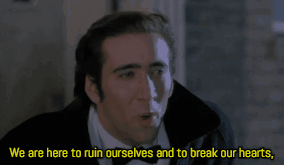

#la surprise des feedbacks#jamais là où on les attend#jérôme fourquet#grande flemme#jérémie peltier#octavia spencer#viola davis#emma stone#abileen & minnie & skeeter#the help#célibataire#forever alone#tyler the creator#IGOR#the medium is the message#marshall mcluhan#moonstruck#cher#nicolas cage#my gifs#all time favourites
2 notes
·
View notes
Text
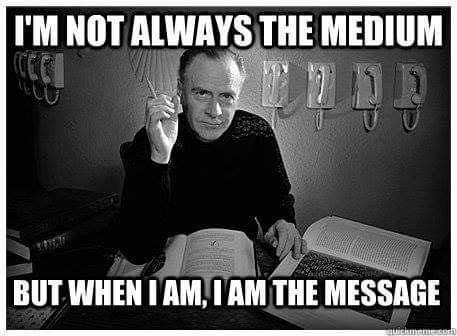
"What we become we behold. We shape our tools, and thereafter our tools shape us."
"I am an intellectual thug who has been slowly accumulating a private arsenal with every intention of using it.
In a mindless age every insight takes on the character of a lethal weapon. Every man of good will is the enemy of society."
- Marshall McMahan
#marshall mcluhan#public intellectual#intellectual thug#the medium is the message#the medium is the massage#author#writer#heretic#heretics#quote
7 notes
·
View notes
Text
My criteria for determining if a game is a piece of art: Is the fact that it's a game integral to its experience? Would it fail utterly if you tried to adapt it to a different medium?
4 notes
·
View notes
Text
The medium is the message
Many things run through our minds when we say the medium is the message, but for those like me who grew up in the 90s, I can say that we are lucky that we have reached the time when the message is filtered and passes through copywriters, copy editors and publishers or producer.
Nowadays what we used to call tri-media is gone. It is very difficult to know the truth from the fake news. Even in culture, there is an effect of what is practised today where everyone is a creator and the patronage is based on the amount of viewers and likes.
It is truly up to us to decide whether to support innovative creators or news providers. But even so, in my observation, what I see missing nowadays is the so-called art. From the many vlogs or content creators I watch. Few of them understand film language, film essentials or simple mise-en-scenes. Yes, we are grateful that we have more choices to get information, but sadly we are losing the sense of quality because it is unfiltered and the true art is missing.
1 note
·
View note
Text
In response to the video essay of Nerdwriter1 on YouTube:
youtube
"The Medium is the message." - Marshall McLuhan
When you think about it, this statement means that the medium or mode of communication has a greater impact on how a message is perceived than the message's actual content. (It highlights how the media shapes our perceptions of knowledge and culture.)
In my opinion, it is not the case for everybody. Well, yeah there are people who are like that as I know some but for me personally, I'm always all about the content itself as the presentation is just the surface. It's just alarming that some people will be carried away and they easily believe something they see. Mainly because it is tailored to them and it is easier to just receive the information and enjoy how it's presented rather than understanding it.
He also went on to say that:
"The effect of the program is incidental."
Which implies that a program's results or effects are a result that happens accidentally or as a byproduct, not the main emphasis or aim. It suggests that the program's primary goal might not be affected by its results, which could be accidental or incidental.
For me, it could be true at some point. As someone who's been living with the TV and internet, in my understanding, people have different perception and interpretations when it comes to receiving information and how they enjoy any type of media. I remember, sometimes I even get to arguments with the elders because of it. What I'm trying to say is, it is not the case for everybody, although it can happen.
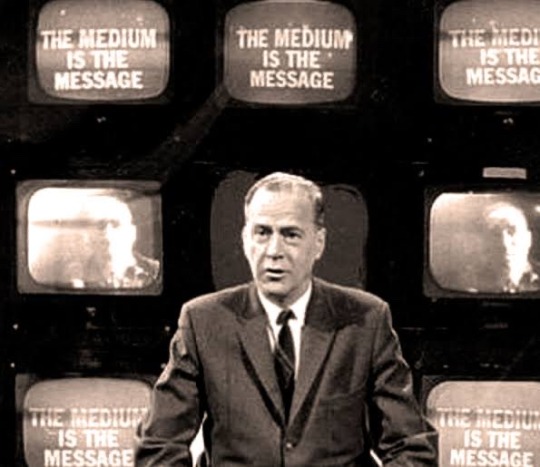
1 note
·
View note
Text
2023 is the Year to Become a Mindful Consumer
With the level of consumerism today, it is good to practice to view everything as an advertisement. This is not to stress you out, but for the benefit of understanding where it's worthwhile to put your time, money, and energy -- all of which affect beyond just you and this current generation. It's an amazing lens to wear to encourage you to consider where your need for purchasing an item, adopting a certain lifestyle, or even following certain social media accounts is coming from. We are all transmitting and receiving messages amongst one another constantly. The question is, "Which messages do I find value in supporting? Are the intentions here pure? Will contributing to this allow me and my community flourish?"
According to Merriam-Webster, an advertisement is "a public notice especially : a paid notice that is published or broadcast (as to attract customers or to provide information of public interest)"
Advertisement comes from the French word avertir meaning "to turn, direct, make aware"
So, understand this: Influencers, celebrities, and politicians are advertisements. Billboards and commercials are advertisements. Labels are advertisements. News broadcasts are advertisements. Newspaper/article headlines are advertisements. BUT ALSO...The clothing one wears is an advertisement (even if it is devoid of branding). One's behavior is an advertisement. A facial expression is an advertisement (informing others of one's feelings). Artworks are advertisements. Institutions of education are advertisements. Songs are advertisements. Blogs are advertisements. Photos uploaded to social media are advertisements. Speeches, sermons, and talks are advertisements.
All that influences you to make certain choices in your day is an advertisement. Some things are advertising positive messages. Some are advertising horrible messages. And others are offering mixed messages.
We don't realize the depth of advertisements in our lives, for one, because we are told to be advertisements ourselves. It feels important to our survival: to attain enough money, admiration, and acceptance. We are encouraged to look a certain way on paper (resumes, CVs, cover letters, report cards, exam scores, etc), in media (photographs, interviews, podcasts, videos), and in face-to-face interactions (accents, fashion style, body shape, makeup, etc).
We don't want to lose authenticity amongst friends and family. We want to talk to real human beings on emotional, logical, and spiritual levels, right? Becoming a mindful consumer is coupled in with helping you realize what you stand for, remain an active thinker, and hold secure with your empathy. When you step up in this aspect, it will encourage others to do the same. It's important that we stay connected with being truthful & kind individuals with depth, I would think.
HOW TO (remember what I defined as an advertisement):
Notice what is being advertised. Is there a literal product (you may need to look for product placement, scripted review, restrictions on sharing honest opinion, etc)? An ideal? A societal standard? A new concept?
What was your honest emotional response to the advertisement? Did it seem alluring? Revolting? Boring? Intriguing? Disturbing? Confusing? Frustrating? (Notice as well what your gut feelings are saying).
Notice what sensory aspects of the advertisement affected your emotions. Was it the color palette, music, filter, word choice, lettering, vocal inflection, etc? What is the general vibe of the advertisement? Is it cheery? Fearful? Hopeful? Inspiring? Angry? Degrading? Does the emotional vibe make sense with the message?
Notice the intentions behind the advertisement. Is the predominant intention here to gain money? Make positive change for those struggling? Deceive or confuse people? Spread gossip or hate? Encourage? (Know about the characters of the individuals, the pasts of the companies, the institutional influences, the historical comparisons which can be drawn, if individuals are being taken advantage of, how true are the claims, if there is funding going on). Does the advertiser show indication of integrity? Do they make use of "experts," popular individuals, and buzz words to distract from the natural inclination to find proof or reason to approve of the advertisement's messaging?
If you are left at all unsure if you agree with what is being advertised, do research (be sure you know how to find reliable sources, but sometimes it's worth seeing what the opposition/competitors/opposing perspectives say too). It's always good to be informed. You can even send questions directly to the person or company advertising. Evaluate with logic & intuition, to avoid letting pure, knee-jerk emotionality to do the decision-making.
Remain flexible to change your mind about your initial evaluations. Sometimes, we aren't always accurate the first time because we didn't have a full enough picture.
Generally, it's good to realize that labels/appearances/glimpses are not going to fully or accurately represent the truth of what is being advertised. It's up to us to notice how true they are. Look at the fine print.
PRACTICE: look at the ads on television, social media pages, magazines, newspapers, and websites. Move into considering songs, television shows, movies, social media videos, and documentaries. And keep on evaluating as you expand what you consider to be an advertisement.
‼It helps to gain knowledge of what the most influential people, titles (eg. doctor, specialist, best-seller, award-winner, etc), and institutions are. They usually are not widely scrutinized and so their messages are taken on as near fact. They also will be able to influence entire markets/spheres/communities with ease.
GOOD DEMONSTRATIONS: a b
#txt#unlearning#consumerism#late stage capitalism#advertising#marketing#mindful living#slow living#intentional living#the medium is the message#critical thinking#awareness#holistic leveling up#leveling up#level up journey#third eye#mindfulness#spiritual growth#persuasion#industrialization#solarpunk#mindful consumerism#ethical consumption#sidewalkchemistry
48 notes
·
View notes
Text
Marshall McLuhan in Understanding Media (1964)
"I am in the position of Louis Pasteur telling doctors that their greatest enemy was quite invisible, and quite unrecognized by them. Our conventional response to all media, namely that it is how they are used that counts, is the numb stance of the technological idiot. For the "content" of a medium is like the juicy piece of meat carried by the burglar to distract the watchdog of the mind.”
[emphasis added]
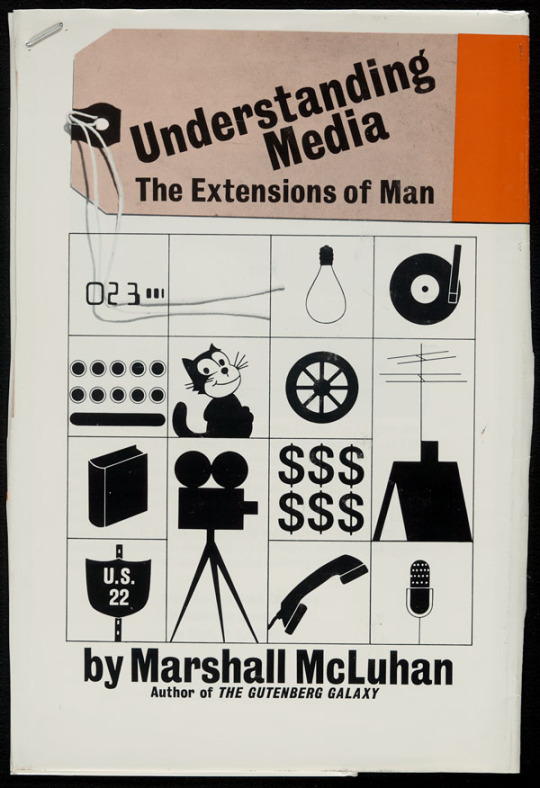
0 notes
Text
I know the goal of Ai is to get it to be “good” (read:produce things that look real, human made, and without glitch) but I for one really like the era where they produce fucked up, fritzing-out surrealist too bad to fully be plagiarism glory. I for one welcome The T Whoinis Kiovw.

#just like with video games and animation#the race to realism is not a race to the top#ai#ai art#art#van gogh used the thickness of the pain itself#use the glitch of the tool#the medium is the message#The T Whonis Kniovw#also compensate human artists!
0 notes